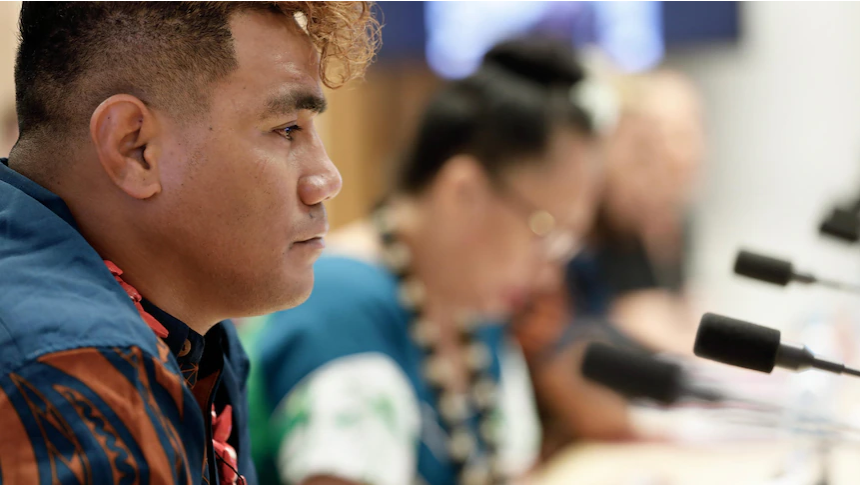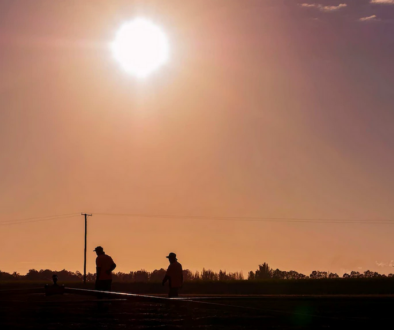
Foreign farm workers left with just $100 after week’s work as employer makes major deductions
Originally published on abc.net.au written by Kath Sullivan and Johanna Marie
One of Australia’s largest labour hire firms oversaw foreign workers pocketing just $100 per week after it deducted hundreds of dollars in additional costs.
That was despite the company’s chief executive telling a Senate committee the workers earned more than expected under the Australian government’s Pacific Labour Scheme.
Two Samoan whistleblowers have also told of how they felt “punished” for giving earlier evidence against the labour hire firm.
On Thursday, a Victorian strawberry grower told the Senate Select Committee on Job Security that a worker named Aleki had earned more than $900 for a week’s work.
Sunny Ridge’s managing director Matthew Collard said Aleki’s take home pay was significantly reduced when the labour hire firm MADEC deducted several costs.
“Aleki on December 8 last year did a total 30.38 hours and we paid $937.20, and then with MADEC’s deductions and tax he netted $100 for that week,” Mr Collard told the committee.
Labor Senator Tony Sheldon, who chaired the hearing, likened the final payment to earning about $3 per hour.
Farm claims 64-hour week payslip ‘fabricated’
Mr Collard addressed the committee in response to allegations made at a February hearing that another Samoan employee, Talipope, had been paid $100 for a 64-hour working week at Sunny Ridge.
Mr Collard disputed that allegation and said the payslip submitted by Talipope to the committee, dated November 2021, was “fabricated”.
“The reason [the payslip] reflected $100 net after MADEC deductions was predominantly determined by the 19.7 hours he worked. This is a significant variation to 64 hours that was claimed,” Mr Collard said.

He told Thursday’s hearing that pickers were not employed for several days during the week in question due to weather conditions.
Instead, Mr Collard claimed Sunny Ridge had provided $501.85 gross payment for Talipope that week, but it was reduced to $100, again, after MADEC deductions.
MADEC’s chief executive Laurence Burt told the hearing that costs were recovered for several reasons.
“In the first ten weeks of someone’s arrival into Australia on the seasonal worker program they work through a process of paying for the international airfare, visa costs, cash advance and other on-arrival expenses … that’s spread across the first initial weeks of engagement and recovered on a weekly basis,” Mr Burt said.
“In addition to that, there are weekly living costs such as accommodation, transport, and health insurance that are also recovered out of workers’ salaries each week by their approved employer as well.”
One MADEC payslip submitted to the inquiry showed accommodation for one worker was charged at $150 per week.
After the hearing, Senator Sheldon claimed MADEC had also made deductions of $154 for linen.
Mr Burt said that during their first 12 weeks of employment Talipope and Aleki had averaged gross pay of $970 per week, receiving on average $390 per week after deductions.
“The net benefit was about 20 per cent higher than their letter of employment offer indicated,” Mr Burt said.
The letter of employment offer is issued to workers in their home country before travelling to Australia under what is now known at the Pacific Australia Labour Mobility (PALM) scheme.
MADEC is one of Australia’s largest employers of overseas seasonal workers and operates the national Harvest Trail.
Workers punished
Thursday’s hearing also heard how Talipope and Aleki felt they had been “punished” after coming forward to to give evidence at the February hearing.
Speaking through an interpreter, Talipope said he felt compelled to detail his experience and employment with MADEC.
“We wanted to pursue the hearing … to ensure the employer is doing what they are supposed to be doing, legally,” he said.
But when he returned to work at Sunny Ridge, Talipope said he was punished by the employer who stripped him of shifts and his supervisor role.
“That leads to me being laid off as a supervisor. I’m not worried about that, all I want is justice,” he said.
The hearing also heard that Aleki and Talipope were in the process of being redeployed to another farm by MADEC following a request made in January.
The inquiry into job security also heard from Department of Foreign Affairs and Trade officials that evidence from the February hearing had been referred to the Fair Work Ombudsman for investigation.
At the February hearing, Nationals Senator Matt Canavan queried if the conditions of the Pacific Labour Scheme were akin to “indentured labour”.
According to the government, there are currently more than 55,000 Pacific and Timorese workers pre-screened and ready to come and work in Australia.

Foreign farm workers left with just $100 after week’s work as employer makes major deductions
Originally published on abc.net.au written by Kath Sullivan and Johanna Marie
One of Australia’s largest labour hire firms oversaw foreign workers pocketing just $100 per week after it deducted hundreds of dollars in additional costs.
That was despite the company’s chief executive telling a Senate committee the workers earned more than expected under the Australian government’s Pacific Labour Scheme.
Two Samoan whistleblowers have also told of how they felt “punished” for giving earlier evidence against the labour hire firm.
On Thursday, a Victorian strawberry grower told the Senate Select Committee on Job Security that a worker named Aleki had earned more than $900 for a week’s work.
Sunny Ridge’s managing director Matthew Collard said Aleki’s take home pay was significantly reduced when the labour hire firm MADEC deducted several costs.
“Aleki on December 8 last year did a total 30.38 hours and we paid $937.20, and then with MADEC’s deductions and tax he netted $100 for that week,” Mr Collard told the committee.
Labor Senator Tony Sheldon, who chaired the hearing, likened the final payment to earning about $3 per hour.
Farm claims 64-hour week payslip ‘fabricated’
Mr Collard addressed the committee in response to allegations made at a February hearing that another Samoan employee, Talipope, had been paid $100 for a 64-hour working week at Sunny Ridge.
Mr Collard disputed that allegation and said the payslip submitted by Talipope to the committee, dated November 2021, was “fabricated”.
“The reason [the payslip] reflected $100 net after MADEC deductions was predominantly determined by the 19.7 hours he worked. This is a significant variation to 64 hours that was claimed,” Mr Collard said.

He told Thursday’s hearing that pickers were not employed for several days during the week in question due to weather conditions.
Instead, Mr Collard claimed Sunny Ridge had provided $501.85 gross payment for Talipope that week, but it was reduced to $100, again, after MADEC deductions.
MADEC’s chief executive Laurence Burt told the hearing that costs were recovered for several reasons.
“In the first ten weeks of someone’s arrival into Australia on the seasonal worker program they work through a process of paying for the international airfare, visa costs, cash advance and other on-arrival expenses … that’s spread across the first initial weeks of engagement and recovered on a weekly basis,” Mr Burt said.
“In addition to that, there are weekly living costs such as accommodation, transport, and health insurance that are also recovered out of workers’ salaries each week by their approved employer as well.”
One MADEC payslip submitted to the inquiry showed accommodation for one worker was charged at $150 per week.
After the hearing, Senator Sheldon claimed MADEC had also made deductions of $154 for linen.
Mr Burt said that during their first 12 weeks of employment Talipope and Aleki had averaged gross pay of $970 per week, receiving on average $390 per week after deductions.
“The net benefit was about 20 per cent higher than their letter of employment offer indicated,” Mr Burt said.
The letter of employment offer is issued to workers in their home country before travelling to Australia under what is now known at the Pacific Australia Labour Mobility (PALM) scheme.
MADEC is one of Australia’s largest employers of overseas seasonal workers and operates the national Harvest Trail.
Workers punished
Thursday’s hearing also heard how Talipope and Aleki felt they had been “punished” after coming forward to to give evidence at the February hearing.
Speaking through an interpreter, Talipope said he felt compelled to detail his experience and employment with MADEC.
“We wanted to pursue the hearing … to ensure the employer is doing what they are supposed to be doing, legally,” he said.
But when he returned to work at Sunny Ridge, Talipope said he was punished by the employer who stripped him of shifts and his supervisor role.
“That leads to me being laid off as a supervisor. I’m not worried about that, all I want is justice,” he said.
The hearing also heard that Aleki and Talipope were in the process of being redeployed to another farm by MADEC following a request made in January.
The inquiry into job security also heard from Department of Foreign Affairs and Trade officials that evidence from the February hearing had been referred to the Fair Work Ombudsman for investigation.
At the February hearing, Nationals Senator Matt Canavan queried if the conditions of the Pacific Labour Scheme were akin to “indentured labour”.
According to the government, there are currently more than 55,000 Pacific and Timorese workers pre-screened and ready to come and work in Australia.


